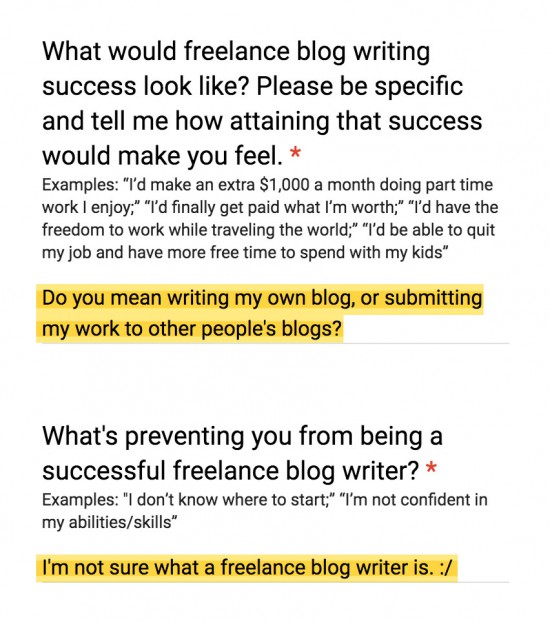
3 lessons learned from launching my 6-figure business
For years, I was that guy.
The one who “never lived up to his potential.” The one who bounced around from one dead-end job to the next, making little money:
- Restaurant manager — $20 an hour
- Appointment setter for a car dealership — $15 an hour
- Telephone interviewer — $15 an hour
I was the guy who spaced out at work, dreaming of my own business. Who never stopped annoying my friends with my ideas for the next big thing.
But I thought I didn’t have the brains, the genes, or the guts to succeed, so I did nothing. It felt safer.
Now that’s all changed. It’s 4 years later, and I’m making six figures from my online business.

My website, FreelancetoWin.com, has generated over $230,000 in the past 12 months
It wasn’t magic. It didn’t happen overnight. I didn’t meditate for hours hoping to “get in touch with myself.”
No, I just studied successful business owners.
It turns out that real entrepreneurs don’t think about starting a business like the rest of us do. And until you adopt their mindset, you will never be successful on your own.
Today I’m going to reveal the three most powerful lessons I learned in this process. These three simple mindset shifts will help you conquer your fear of starting a business and start thinking like a successful entrepreneur.
Mindset shift #1: There’s no such thing as a “natural” entrepreneur
It’s easy to get intimidated watching famous entrepreneurs. They seem like they were “born to succeed.”
But it’s an illusion. There is no “success gene.”
For example, did you know that Mark Cuban’s first job was bartending? Or that Sara Blakely failed her law school entrance exams and worked at Disney World before founding Spanx?
The reason famous entrepreneurs seem so natural is that, by the time you hear about them, they’ve had a lot of practice. Do you remember the first time you heard of Mark Zuckerberg? It was years after he started Facebook.
Want more proof that entrepreneurship is a learned behavior? Check out the chart below. It shows the first jobs of six of the world’s most successful entrepreneurs:
| Entrepreneur | First Job |
|---|---|
| Oprah Winfrey | worked at a grocery store |
| Michael Dell | sold newspaper subscriptions |
| Martha Stewart | babysitter |
| Michael Bloomberg | parking attendant |
| Jeff Bezos | McDonald’s employee |
| Warren Buffett | newspaper delivery boy |
Ready to improve your habits and level up your life? Download our FREE Ultimate Guide To Habits below.
It’s not a superpower. It’s a skill. Figuring that out is the first step every true entrepreneur needs to take.
Here are some action steps to help you get started:
- Read as much as you can about successful entrepreneurs’ histories
- Pay particular attention to where they started, what they were doing before they “made it,” and any failures they encountered along the way
- Ignore the media when they try to portray someone as an overnight success. To paraphrase Shark Tank’s Robert Herjavec, “It takes 10-15 years of hard work to become an overnight success”
- Don’t compare yourself to billionaires. We all have to start somewhere!
- Realize that if others did it, YOU can do it, too. Steve Jobs once said, “Everything around you that you call life was made up by people that were no smarter than you”
Mindset shift #2: Mistakes are good
When we are children, we’re taught early on to avoid mistakes. “Don’t color outside the lines.” “Why didn’t you get an A on the test?” “Be careful not to spill that!”
But successful entrepreneurs love making mistakes, because it teaches them what to avoid in the future.
Take Elon Musk, for example. In January, his company, SpaceX, tried to land a rocket booster onto an ocean barge.
Unfortunately, one of the booster’s landing legs malfunctioned, and the entire thing was destroyed.
You might think the event was an embarrassing failure. But check out Elon’s reaction on Twitter:

RUD means “Rapid Unscheduled Descent” — AKA crash landing!
Most people would have trouble staying this positive if their 10-speed got a flat tire, but Musk sees it as an opportunity to learn and make improvements.
New entrepreneurs need to embrace this mentality. First, mistakes should be expected. Nobody’s perfect. Second, use your mistakes to make positive change.
Since you probably won’t be landing rockets any time soon, let me show you a quick example of a mistake I made a few weeks ago in my online business.
Last month, I sent a survey to more than 10,000 of my email subscribers to see if they’d be interested in buying a course about freelance blog writing.
But most of them didn’t even understand what “freelance blog writing” means!
I received dozens of confused and frustrated responses, like this one:

One of the many confused survey entries I received
Five years ago, an outlash like this would have crushed me.
But today, I don’t let it get to me. I learned a valuable lesson. I never would have known that my readers don’t know what “freelance blog writing” is had I not sent out the survey in the first place.
If you don’t learn to embrace mistakes, you get stuck in analysis paralysis. You spend all your time thinking instead of acting. You can’t grow a successful business that way any more than you can drive a car that’s stuck in neutral.
Here are some action steps to help you overcome your fear of making mistakes:
- Focus more on being decisive and less on trying to make the “right” decision. You’ll never know until you try, and if you’re wrong, you can always try again.
- If a decision is reversible, try to maximize your gain. For example, last year I raised the price of my online course even though there was a chance I’d lose money if readers balked at the cost. The result: I quadrupled the previous month’s revenue. And if I’d been wrong and people didn’t buy, I could easily have changed the price back at any time.
Since the decision to raise the price was easily reversible — which meant my risk was practically nil — my only goal was seeing how big I could grow my business.

My monthly sales quadrupled from September to October of last year
- If a decision is irreversible, try to protect yourself from losses. For example, imagine spending $5,000 on advertising, or giving away 50% of your equity to an investor. Unlike the previous example, you can’t just change your mind if these decisions don’t work out in your favor. So you need to be more conservative with these types of “bets.” For this reason, guest blogging is my favorite way to build an online business — it’s free, and anyone can do it.
- If you do make a mistake, go over it carefully to make sure you don’t repeat it. The key is to figure out exactly what went wrong. Was your plan built on flawed assumptions? Did you execute poorly? Was it a failure of the last mile? Once you figure out the answers, you always win, regardless of the immediate outcome.
Ready to improve your habits and level up your life? Download our FREE Ultimate Guide To Habits below.
Mindset shift #3: Focus on giving, not getting
Typical wantrepreneur fears revolve around me, myself, and I.
“What type of business should I start?” “Will people buy from me?” “What will my friends think if I fail?”
This type of thinking sets you up for failure. Successful entrepreneurs don’t focus on themselves — they focus on helping others. For example, you may have heard Ramit talk about how he gives away 98% of his material for free.
Back when I was stuck in a self-centered mentality, I came up with business ideas only I cared about, like a medical records faxing service no one needed and a new cat food no one wanted.
Once I created a course designed to help other people make their lives better, 1,000+ people joined! In the last 12 months, I’ve made more than $200K!

My past 12 months’ sales: more than $200K from helping others
Plus, some of my blog posts have gotten hundred of comments and shares. And I’ve been able to get additional exposure for my business by guest posting on high-traffic websites in my industry like Business Insider, Copyblogger, and Upwork.
Here are some action steps for creating a business others will love:
- Think about problems you’ve overcome in your career or personal life. Did you train your dog to walk without a leash? Are you ridiculously productive at work? Do you have 20 awesome hacks for overcoming anxiety?
- Talk to people who are similar to you and see if they have the same problems. You can even start with friends and family to make it really easy.
- Once you verify that others also have these problems, teach them how to solve them.
By doing this, you’re showing others that you want to help them improve their lives. That’s how you build the trust that turns them into customers.
Make sure to follow up with the people you’ve helped, too. Once they’ve achieved measurable success, you know you have a proven system that you can confidently charge people to learn. And you also have a business that will succeed.
To become an entrepreneur, think like one
Being a successful entrepreneur isn’t magic. But it’s not difficult, either. All it takes is a few simple changes to the way you think.
Once I began adopting these mindsets, I went from broke wantrepreneur to six-figure business owner in less than 3 years.
A huge bonus of earning money this way is that I get to make a living by helping people improve their lives.
Practically every day I wake up to messages from people I didn’t even know beforehand, thanking me for helping them do work they enjoy, charge what they’re worth, and enjoy more freedom.



